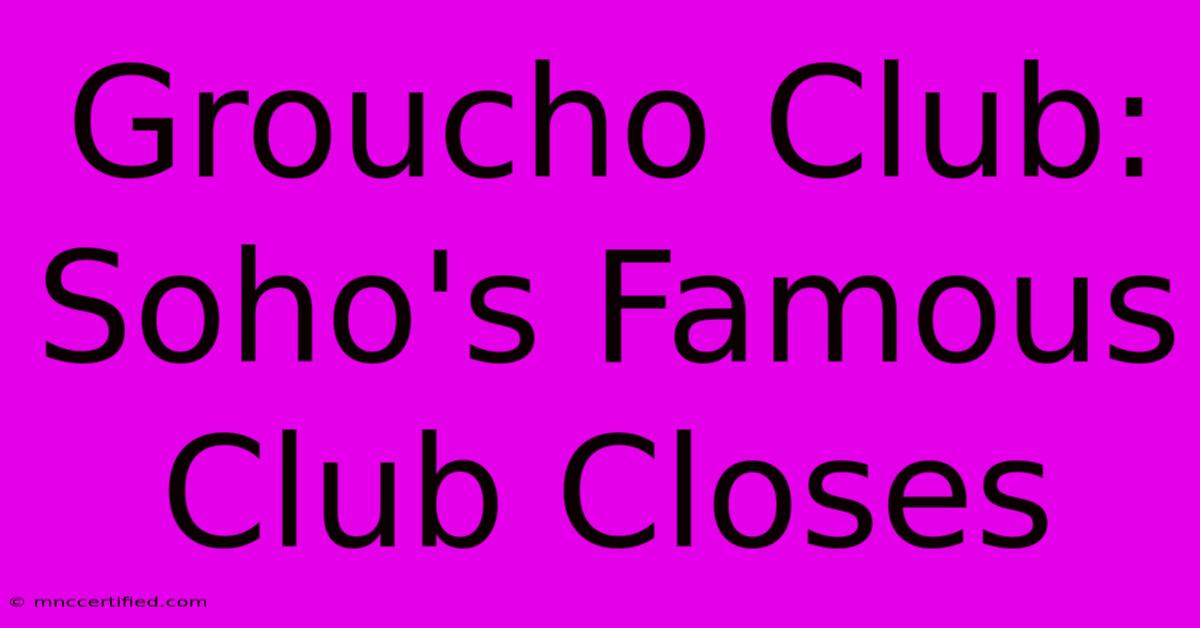Groucho Club: Soho's Famous Club Closes

Table of Contents
Groucho Club: Soho's Famous Private Members' Club Closes its Doors
The Groucho Club, a legendary Soho institution and haunt of celebrities, artists, and writers for over three decades, has announced its closure. This news has sent shockwaves through London's creative community, leaving many reminiscing about its vibrant history and unique atmosphere. This article explores the reasons behind the closure, its lasting legacy, and what the future holds for the iconic building.
The End of an Era: Why Did the Groucho Close?
While the official statement cited "challenging economic conditions" as a primary factor in the Groucho Club's closure, the reality is likely more nuanced. The rise of online social networking, changing social habits, and the increasing competition from newer, trendier private members' clubs all contributed to a decline in membership and profitability. High operating costs in a prime central London location undoubtedly exacerbated the situation. The club's unique, somewhat bohemian charm, while historically attractive, may have also become less appealing to a younger generation seeking different kinds of social experiences. Rising rents and staff costs in the heart of Soho also played a significant role in the club's financial struggles.
A Legacy of Creativity and Celebrity
For decades, the Groucho Club was more than just a private members' club; it was a cultural hub. Its dimly lit rooms witnessed countless creative collaborations, clandestine meetings, and legendary parties. From its early days as a gathering place for the alternative arts scene to its later incarnation as a hotspot for celebrities and media personalities, the Groucho held a unique position in London's cultural landscape. Famous members included everyone from fashion designers to actors and musicians, fostering a dynamic and vibrant atmosphere. The club's famously strict membership policy, rumored to be based on a subjective assessment of applicant's "interestingness", only added to its mystique.
Remembering the Groucho: Memorable Moments and Lasting Impact
The Groucho Club fostered a sense of community and creativity that few other venues could match. Many famous writers, artists, and musicians found inspiration within its walls. The club's relaxed yet sophisticated atmosphere allowed for genuine connections to flourish. The legendary stories and anecdotes surrounding the club will undoubtedly live on, forming a part of London's rich cultural history. Its influence extended beyond its membership, shaping the landscape of Soho and inspiring countless individuals. The unique character of the club, a blend of artistic bohemianism and upscale sophistication, remains unparalleled.
What Happens Next? The Future of the Building
The closure of the Groucho Club leaves the future of its iconic building uncertain. Speculation abounds regarding its potential redevelopment. The prime location in the heart of Soho makes it a highly desirable property, potentially attracting high-end retailers, restaurants, or even a hotel. The building's historical significance, however, will hopefully be considered in any future development plans. Preserving some aspect of its legacy would be a fitting tribute to the Groucho Club's enduring cultural impact.
The Groucho's Enduring Legacy: More Than Just a Club
The closure of the Groucho Club marks the end of an era. But the club's lasting legacy extends far beyond its physical space. Its influence on London's cultural landscape and the countless memories it created for its members will continue to resonate for years to come. The stories, the connections, and the unique atmosphere will remain a significant part of Soho's and London's history. The loss is felt deeply by many, but the spirit of the Groucho – a spirit of creativity, connection, and a certain je ne sais quoi – will undoubtedly live on.

Thank you for visiting our website wich cover about Groucho Club: Soho's Famous Club Closes. We hope the information provided has been useful to you. Feel free to contact us if you have any questions or need further assistance. See you next time and dont miss to bookmark.
Featured Posts
-
Garden State Trading Card Show
Nov 28, 2024
-
Investment Properties In Tampa
Nov 28, 2024
-
Fa Reviewing David Cootes Actions
Nov 28, 2024
-
What Does A Secured Bond Mean
Nov 28, 2024
-
United Airlines Teamsters Rally Nationwide
Nov 28, 2024